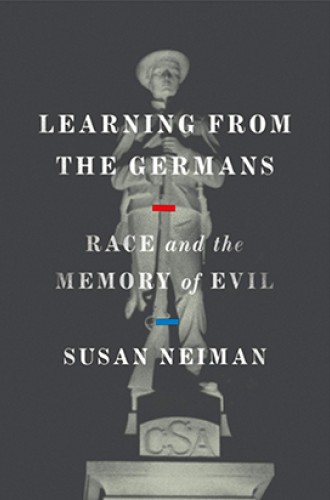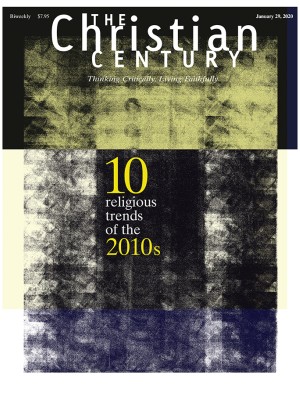For their podcast White Lies, journalists Andrew Beck Grace and Chip Brantley returned to their native Alabama to investigate the 1965 murder of James Reeb, a Unitarian minister from Boston who was beaten to death while marching for racial justice in Selma, Alabama. The three men who were seen committing the crime were brought to trial later that year—and were acquitted by an all-white jury. One surviving member of that jury refused to speak about the case, telling Grace and Brantley that it was “a thing of the past. It’s all gone. It’d be better if it’s forgot about.”
During their search for the truth about Reeb’s murder, Grace and Brantley realized that they weren’t just piecing together facts. They were obliged to “think critically about how, collectively, white people have done a very poor job of being honest about the sins of the past.”
Read our latest issue or browse back issues.
Susan Neiman’s book embodies this concept of naming and working through collective sin. Neiman, a philosopher and the director of the Einstein Forum in Berlin, has lived in Berlin for much of the past four decades. But she grew up in the segregation-era South. During her time in Berlin, both before and after reunification, she saw firsthand the process by which Germany has reckoned with its Nazi past. These experiences inspired her to return to her native South to explore how Americans might use examples of Germans’ engagement with collective sin to bring about reconciliation in their communities.
The Germans have a word, Vergangenheitsaufarbeitung, which means “working through the past.” The term came into use in the 1960s, Neiman explains, as “an abstract polysyllabic way of saying We have to do something about the Nazis,” even those in our families. Reckoning with the past is a communal process, enlivened through experience and discussion. It starts with a “coherent and widely accepted national narrative,” reinforced by symbols and transported through education. The process asks which heroes we valorize, which victims we mourn, what we are taught to remember, and what we are meant to forget.
Vergangenheitsaufarbeitung, even when practiced as a matter of consensus, can be difficult. It works against our “natural impulse to believe that we, and our tribe, may make mistakes, but nothing that merits a word like evil.” It takes away the comforting illusion that “evil is what others do.”
The discomfort that arises from working through the past can be seen in Germany’s Stolpersteine (“stumbling stones”) project. Conceived by the artist Gunter Demnig, the project places a four-inch-square brass plaque at the location where a resident was forcibly deported from his or her home by the Nazis. Although the project has placed over 70,000 stumbling stones throughout Europe, it is not without controversy. Some municipalities in Germany, including Munich, prohibit this form of remembrance.
Neiman also writes about a 1995 exhibit about the Wehrmacht—the Nazi army of 18 million—that was curated by the Hamburg Institute for Social Research. The exhibit caused an uproar among millions of Germans who had not worked through their own collective and individual crimes. The exhibit used “soldiers’ letters and photographs to reveal that Nazi military crimes were not limited to elite SS units, nor confined to a few bad apples”—a point that had long been asserted by German and foreign historians alike. Nevertheless, “reactions to the exhibit showed how many still believed the myth that the Wehrmacht was clean, even gallant.”
The myth of the guiltless Wehrmacht reminded Neiman of “nothing so much as the defenders of the Lost Cause version of Confederate history,” the mythical rebranding of “the Civil War as a noble fight for Southern freedom” which she frequently heard as a white girl in the segregated South. As she thought about countering myths of innocence in Germany, Neiman traveled to Mississippi in 2016 and 2017 to talk with people who are working to dismantle the Lost Cause mythology.
Among the people she interviewed was Bryan Stevenson, the founder of the Equal Justice Initiative and creator of the National Memorial for Peace and Justice in Montgomery, Alabama. One aspect of the memorial, consciously modeled after the stumbling stone project, is a series of some 800 columns, one for each county in which the Equal Justice Initiative has documented at least one lynching. Each column contains the names of all known lynching victims from that county. The EJI has invited each of the counties represented to take an identical column home, so that these remembrances can become a part of the southern landscape.
Neiman acknowledges that her account is limited: she writes about what she knows as a child of the South and as an adult expatriate in Berlin. Her account of race in the US focuses only on the South, although she suggests that a similar reckoning is needed in other regions. Indeed, the historian James Loewen has rediscovered thousands of “sundown towns” in the North where it was made known, either by law or custom, that black Americans were not welcome. The history of genocide against Native Americans also calls for the kind of reckoning Neiman models.
The accomplishment of this book is that it asks how we can live in a world riven with evil—evil that we may have tolerated or even perpetrated. The kind of communal reckoning Neiman identifies is hard but necessary. “How we remember the past constrains the possibilities for the future.” Crafting a narrative that acknowledges our collective sins can set us up to envision a society that reimagines justice.







